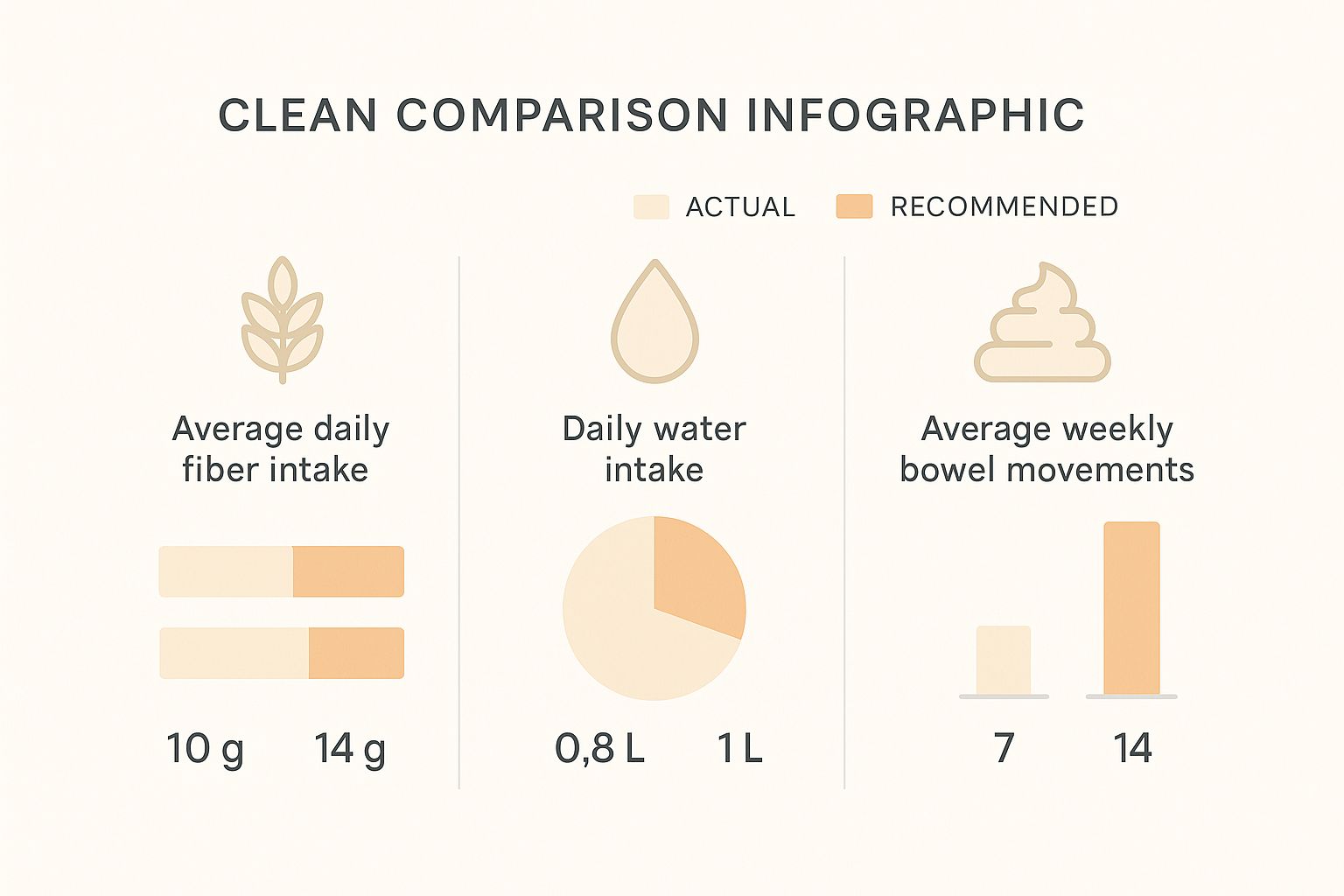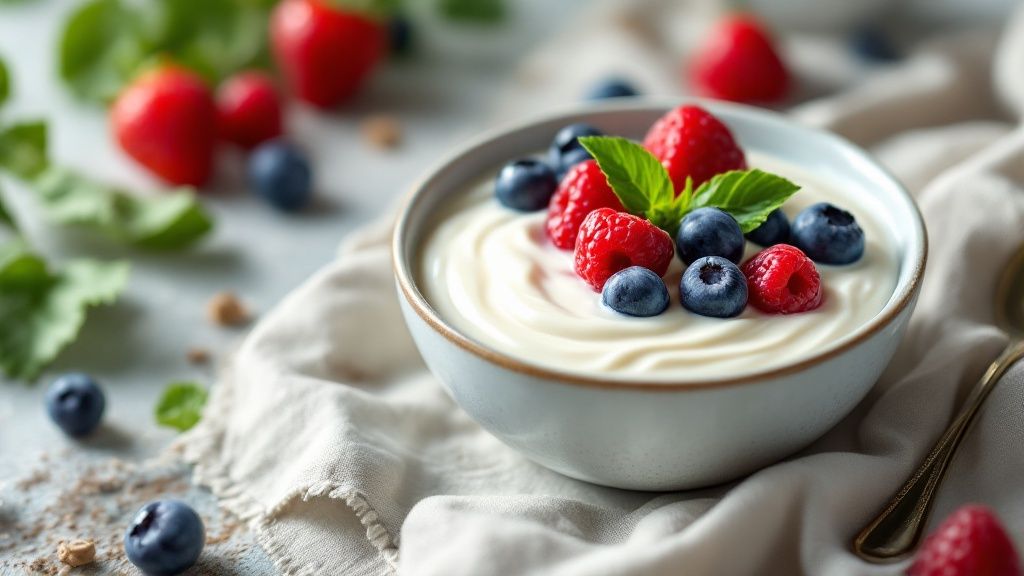Probiotics for Toddlers Constipation: A Parent's Guide to Gentle Relief
There’s nothing tougher than watching your little one struggle with constipation. If you're in the thick of it, please know you are not alone. It's frustrating and worrying, but we're here to help. Probiotics can be a wonderfully gentle and effective way to get their digestive system back on track, helping to soften stool and promote regular, comfortable bowel movements. Let’s walk through how they work and how to make them a simple, stress-free part of your day.
Getting to the Bottom of Your Toddler's Tummy Troubles

It’s one of the hardest parts of being a parent-seeing your child squirming in discomfort, clearly having a tough time. Toddlerhood is filled with massive changes, and their little digestive systems often feel the bumps in the road.
This super common issue is often called functional constipation, which simply means it’s not typically caused by a serious medical problem. More often than not, it's a byproduct of everyday toddler life.
The Usual Suspects: Why Toddlers Get Backed Up
So, what's really happening inside that tiny tummy? The culprits are often simple and tend to overlap. A toddler's gut is a delicate, developing ecosystem. When something throws that balance off, the whole system can slow to a crawl.
Here are a few of the most common reasons things get stuck:
- The Picky Eater Predicament: Is broccoli suddenly public enemy number one? A diet that’s low in fiber from fruits, veggies, and whole grains is a classic trigger for constipation.
- Forgetting to Hydrate: Toddlers are busy! They're exploring their world and can easily forget to drink enough water. Dehydration makes stools harder and much more difficult to pass.
- Big Changes, Little Tummies: Starting potty training, heading off to daycare, or even going on a family vacation can throw a wrench in their regular bathroom routine.
- The Fear Factor: Sometimes, all it takes is one painful bowel movement for a toddler to decide they're not doing that again. They start actively "holding it in," which creates a frustrating cycle that can be tough to break.
We’ve been in your shoes. Our founder, Sam, vividly remembers the stress of trying to solve his own family's digestive issues. That personal experience is the driving force behind our mission: to create gentle, effective, and simple solutions for families just like yours.
Telltale Signs to Look For
It's not just about how often your toddler is going to the bathroom; the quality of their bowel movements is just as telling. Spotting the signs early helps you jump in with the right support. You can learn more about how to improve gut health in our comprehensive guide.
Keep an eye out for these common red flags:
- Having fewer than three bowel movements in a week.
- Stools that are hard, dry, or look like little pellets.
- Visible straining, crying, or pain during a bowel movement.
- A firm, bloated-looking belly.
- Small streaks of blood on the stool, which can happen from the strain.
Figuring out the "why" behind the constipation is the first real step toward relief. It’s not about blame; it’s about understanding how to gently support their little body. Once we identify the triggers, we can build a plan to get things moving smoothly again-and that’s exactly where the right probiotics can make a world of difference.
How Probiotics Gently Help a Backed-Up Toddler
So, how do these tiny, invisible “good bugs” bring such big relief to your little one’s tummy? It can feel a bit like magic, but the science behind how probiotics work is actually pretty straightforward and, most importantly, incredibly gentle.
Think of your toddler's gut as a bustling garden. For things to grow well and run smoothly, you need plenty of "helper plants" (probiotics) to keep the "weeds" (bad bacteria) from taking over. When constipation strikes, it's often a sign that this delicate garden is a little out of whack.
Introducing probiotics is like planting more of those powerful little helpers. They don’t just sit there-they get right to work.
Putting the Gut Gardeners to Work
The main job of probiotics for toddlers constipation is to bring harmony back to their developing microbiome. These beneficial bacteria are multitasking superstars, tackling the problem from a few different angles to get things moving naturally.
Here’s a look at their gentle game plan:
- They soften stool: Probiotics help pull more water into the bowel. This naturally softens hard, dry stools, making them much easier and less painful for your toddler to pass.
- They get things moving: These good bacteria help improve what scientists call "gastrointestinal motility." In simple terms, they gently encourage the natural wave-like muscle contractions of the intestines to push things along at a steady, regular pace.
- They rebalance the ecosystem: By boosting the population of good bacteria, probiotics make it tougher for the less helpful bacteria to thrive. This creates a healthier gut environment where digestion works the way it's supposed to.
This isn’t just a theory; it's a real biological process. Probiotics produce helpful substances, like short-chain fatty acids, that feed the cells lining the colon and gently stimulate movement. It's a natural, internal support system.
Science Corner: A Look Behind the Scenes
It’s one thing to talk about “good bugs,” but what are they actually doing in there? The science is both fascinating and reassuring. Once these helpful microbes settle in, they kick off a chain of positive effects.
The core idea is simple yet profound: A happy, balanced gut is a gut that works properly. Probiotics are the team captains that help lead the gut back to its happy place.
They do this by producing specific compounds that change the gut environment for the better. Research shows that probiotics help modulate the gut microbiota, produce substances like short-chain fatty acids, and lower the pH in the intestines. All these changes work together to encourage the intestines to move things along, leading to more frequent and comfortable poops. If you're curious, you can explore the full research on how these mechanisms work.
This is precisely why probiotics are such a smart approach. Instead of forcing a bowel movement with a harsh laxative, you're fundamentally improving the health and function of your toddler’s digestive system from the inside out. It's a supportive strategy, not an aggressive one.
Here’s an easy way to think about it: a harsh laxative is like manually pushing a stuck car. Probiotics are like tuning up the engine so the car can run smoothly on its own. The goal is to restore your toddler’s natural rhythm, not just get a temporary fix. This gentle rebalancing act is what makes probiotics such a trusted and effective partner for parents navigating the frustrating world of toddler constipation.
Choosing The Best Probiotic Strains For Constipation
Walking down the supplement aisle can feel overwhelming, can't it? You see row after row of bottles labeled "probiotic," and it's easy to assume they all do the same thing. But here's a little secret from those of us who live and breathe this stuff: "probiotic" is a broad term, a bit like the word "fruit."
You’d pick a banana for potassium and an orange for vitamin C, right? It’s the exact same idea with probiotics. You have to choose specific strains to do specific jobs, especially when you’re trying to help your toddler’s sensitive system.
Meet The Constipation-Fighting All-Stars
When it comes to gently resolving your toddler’s constipation, we need to call in the specialists. The real heroes for tiny tummies belong to two main families of bacteria: Bifidobacterium and Lactobacillus. Think of them as the A-team of the gut world.
These are the two groups most heavily studied for their ability to safely and effectively get things moving for little ones. The gold standard of research-randomized controlled trials-has repeatedly shown that certain strains from these families make a real difference for toddlers with chronic constipation. For a closer look at the science, you can explore the research on probiotic precision for toddlers.
Let's break down a few of the most effective and well-researched strains you should be looking for on a product label.
-
Bifidobacterium lactis: This one is a true powerhouse for promoting regularity. It's known for its incredible resilience, surviving the long journey through the digestive tract to do its job. It helps improve what scientists call "colonic transit time"-or in normal parent-speak, how quickly poop moves through the gut. A faster, smoother journey means less time for it to become hard and dry.
-
Lactobacillus rhamnosus GG (LGG): As one of the most studied probiotic strains on the planet, LGG is famous for its gut-balancing act. While it’s a champion for overall digestive health and immunity, it also plays a crucial role in creating a healthy gut environment that naturally supports comfortable, regular bowel movements.
-
Bifidobacterium longum: Think of this friendly bacterium as a gentle coach for a sluggish system. It helps produce acids that can gently stimulate the intestinal walls, encouraging the natural muscle contractions needed to push things along.

This image really drives home how common dietary gaps are for our little ones and why targeted support from a probiotic can be so beneficial. It’s clear many toddlers aren't getting quite enough fiber or water, which are the absolute foundations for preventing constipation in the first place.
Top Probiotic Strains For Toddler Tummies
Feeling a bit more confident about reading those labels? To make it even simpler, here’s a quick-glance table to help you understand what each of these all-star strains brings to the table.
| Probiotic Strain | What It Does | Best For |
|---|---|---|
| Bifidobacterium lactis | Speeds up stool movement through the gut to prevent it from getting hard and dry. | Directly promoting more frequent and comfortable bowel movements. |
| Lactobacillus rhamnosus GG (LGG) | Fosters a balanced and healthy gut environment, which is key for overall regularity. | Supporting long-term digestive wellness and a healthy immune system. |
| Bifidobacterium longum | Gently stimulates gut muscles and helps produce acids that encourage movement. | A sluggish digestive system that needs a little nudge to get going. |
By focusing on these proven strains, you can take the guesswork out of choosing a probiotic. You’re no longer just hoping for the best; you're on a clear path to giving your toddler effective, targeted support.
Ultimately, it’s about understanding that different strains have different strengths. This knowledge empowers you to move past the confusing marketing and make an informed choice for your child. You’re not just buying another supplement-you’re strategically supporting their digestive health with the specific tools their little tummy needs to feel good again.
A Gentle Gummy Solution Toddlers Actually Love

We can talk about the science and the specific strains all day, but let's be real-none of that helps if you can't get your toddler to actually take the supplement. We've all been there, trying to coax a suspicious little one into swallowing a pill or drinking a chalky powder. Yikes! It’s a battle no parent wants to fight, especially when you’re already stressed about their discomfort.
This is exactly why we created a solution that feels less like medicine and more like a treat. We knew the real-world challenge wasn't just finding the right ingredients, but ensuring kids would take them consistently. Because with probiotics, consistency is everything.
Bridging the Gap Between Science and Snack Time
Remember our chat about choosing specific, effective strains? That wasn't just theory-it’s the foundation of our formula. We intentionally selected Bacillus coagulans, a hardy, spore-forming probiotic known for its incredible resilience.
This particular strain is a rockstar for a few key reasons:
- It’s tough: Unlike many other strains, Bacillus coagulans can survive the harsh, acidic journey through the stomach. It arrives in the intestines alive and ready to get to work where it's needed most.
- It's effective: Studies have shown it can help improve stool consistency and frequency, making it a perfectly targeted choice for relieving constipation in little ones.
- It's gentle: It works to restore balance in the gut microbiome, supporting a healthy digestive environment without being harsh on a toddler's sensitive system.
To make it even more effective, we paired this powerhouse probiotic with its perfect partner: prebiotics. Think of it this way: if probiotics are the "good seeds" you plant in your gut garden, prebiotics are the "fertilizer" that helps them grow and thrive. This team ensures the good bacteria have all the fuel they need to do their job right.
A Founder’s Story, A Parent’s Mission
The idea for Yuve didn't start in a boardroom. It came from the heart of a family who knew the struggle with digestive issues all too well. Our founder, Sam, experienced firsthand the frustration of trying to find supplements that were not only effective but also clean, gentle, and something his own family would happily take.
He was tired of seeing products loaded with artificial junk, gelatin, and questionable ingredients. More than that, he was tired of the daily struggle to get his kids the support they needed.
"I remember thinking, 'There has to be a better way.' I wanted a probiotic that I could feel great about giving to my kids-one that was backed by science, made with clean ingredients, and tasted so good they'd actually ask for it. That personal mission became the blueprint for everything we do at Yuve." - Sam, Founder of Yuve
This personal journey is infused into every gummy we make. We created our Yuve Kids Probiotic & Prebiotic Gummies to be the solution we wished we had all those years ago. They are vegan, gelatin-free, non-GMO, and come in a delicious natural strawberry flavor that finally ends the daily supplement battle.
Making Gut Health Easy and Delicious
Supporting your child’s health shouldn’t be another source of stress in your day. It should be a simple, positive part of your routine. By creating a gummy that tackles the core issues of toddler constipation with proven ingredients, we’ve turned a daily chore into a happy moment.
No more hiding powders in applesauce or pleading with a stubborn toddler. Just one or two tasty gummies a day provides the targeted probiotics for toddlers constipation that their little tummies need to find a happy, regular rhythm. It’s the easy win every parent deserves.
What to Expect and How to Dose Safely

As a parent, your child's safety is non-negotiable. We get it. The thought of giving your toddler something new, even something natural, can bring up a lot of questions. But when it comes to using probiotics for constipation, you can rest easy-the science is incredibly reassuring.
The consensus is clear: high-quality probiotics are overwhelmingly safe and well-tolerated by even the littlest bodies. A mountain of research has shown that these "good bugs" are a gentle way to support their still-developing digestive systems.
Figuring Out the Right Amount
One of the first questions on every parent's mind is, "How much is enough?" That's a smart question, and the best answer always starts with a quick chat with your pediatrician. They have the full picture of your child's health and can offer the most personalized advice.
When you start comparing products, you'll see a measurement called CFU, which stands for Colony Forming Units. This is just a simple way of counting the number of live, active bacteria in each dose.
- A typical daily dose for toddlers falls somewhere between 1 and 10 billion CFUs.
- The golden rule is to start low and go slow. Begin with the smallest recommended dose on the package and give your child's body time to adjust.
- Consistency is everything. Probiotics work best when given daily, as this helps maintain a healthy, thriving population of good bacteria in their gut.
The single most important thing you can do is choose a product made specifically for children. Adult formulas often contain much higher CFU counts and different bacterial strains that aren’t designed for a toddler's more delicate system.
What to Expect When You Begin
So, you've started your toddler on a probiotic. What happens now? It's helpful to remember that rebalancing a tiny tummy is a process, not an overnight fix.
Some parents see a change in stool softness or frequency within a few days. For others, it might take a couple of weeks for the good bacteria to really establish their new home and start making a difference. Patience is your best friend here.
You might also notice a little bit of extra gas or mild bloating at first. Don't panic! This is often a sign that the probiotics are doing their job, actively changing the gut environment for the better. This temporary adjustment phase usually passes quickly.
Grounded in Reassuring Research
If you ever feel that flicker of parental worry, it helps to lean on the science. Study after study confirms the safety of probiotics for children.
Despite some limitations in the available research, probiotics have consistently been found to be safe, with no significant increase in adverse side effects reported. While studies show a positive trend in improving constipation symptoms like how often kids go, the evidence is still growing for using them as a standalone cure.
What this really means is that probiotics are a powerful and safe tool, but they work best as part of a team. Pair them with a diet full of fiber and plenty of water, and you have a winning combination. Think of probiotics as the foundation that makes all your other healthy efforts even more effective-a gentle, science-backed approach you can feel good about.
Your Action Plan for a Happy Tummy
Okay, let's turn all this science into a simple plan you can actually use. Knowing why probiotics help is great, but what really matters is knowing what to do tomorrow morning when your little one is feeling uncomfortable.
Think of this as your daily game plan for getting your toddler’s digestion running smoothly again.
Probiotics are an amazing starting point, but they really shine when they're part of a team effort. When you pair them with the right foods, enough water, and a little bit of fun, you create a powerful system for gut health that really works.
Your Daily Happy Tummy Checklist
This isn't about completely changing your life overnight. It’s about taking small, consistent steps that make a huge difference for your toddler.
-
Start with the Easy Win: Kick off your morning routine with Yuve Kids Probiotic & Prebiotic Gummies. It’s a tasty, no-fuss way to give their gut a daily boost of good bacteria and the prebiotic fuel those little helpers need to flourish.
-
Serve Tummy-Friendly Foods: Gently weave more fiber-rich foods into their meals and snacks. Think "P" fruits: pears, plums, and peaches are fantastic. Berries are another great option. Even a small bowl of oatmeal with a few berries can make a real difference.
-
Be a Hydration Hero: Toddlers are busy and often forget to drink enough water. Make it a game! Use a special cup they love or make "fancy" water with a few slices of strawberry or cucumber. Proper hydration is non-negotiable for keeping stools soft and easy to pass.
-
Add Some Movement Magic: A body in motion helps keep the gut in motion. You don't need a formal exercise plan-just get them moving. A game of tag in the yard, a silly dance-off in the living room, or a quick walk to the park can gently stimulate their intestines.
Building a Comprehensive Approach
Creating a healthy, happy gut is a marathon, not a sprint. While our probiotic gummies are a fantastic tool, it's also smart to make sure their whole diet is rich in fiber. For some more ideas on how to do that, you can find great info in our article on prebiotic fiber gummies.
It can also be helpful to look into other gut support supplements to see what else might fit into your child’s routine. Every little one is unique, so finding the right combination of support is what it's all about.
The real secret to success? Consistency. Stick with this plan for a few weeks. Before you know it, you'll likely see a happier, more comfortable kid. You’re not just solving a problem for today-you're building healthy habits that will support them for years. You’ve got this.
Frequently Asked Questions
It’s only natural to have a few more things on your mind. When it comes to our kids, we all want to be completely sure about the choices we’re making. So let's clear up some of the most common questions we hear from parents.
How Long Does It Take for Probiotics to Help with Constipation?
This is probably the number one question on every parent's mind. While you might see a change in stool softness within a few days, it's more realistic to expect a gradual improvement over one to two weeks.
Think of it this way: probiotics aren't an overnight fix like a laxative. They're working behind the scenes to gently restore balance to your toddler's entire gut. The key is consistency. Sticking with it every day allows those good bacteria to set up shop and really thrive. Patience is your best friend here!
Is It Okay for My Toddler to Take Probiotics Every Day?
Yes, absolutely! In fact, daily use is the best way to get real, lasting results. It’s a lot like watering a plant-a little water each day helps it grow strong and healthy, while watering it just once in a while doesn't do much good.
Taking a probiotic every day helps maintain a stable, happy community of beneficial bacteria in their gut. This is what leads to long-term digestive health and predictable, comfortable bowel movements. It's a safe and gentle addition to their daily routine.
Should I Be Worried About Side Effects?
This is a big concern for any parent, but the good news is that side effects are rare and almost always very mild. When you first start, you might notice your toddler has a little temporary gas or bloating.
Don't panic if you see this. It's usually a sign that the good bacteria are getting to work and shaking things up in the gut for the better. This typically disappears within a few days as their little system gets used to the new tenants.
What's the Difference Between Probiotics and Prebiotics?
That's a fantastic question, because these two really work as a team. It’s simple when you break it down:
- Probiotics are the live, beneficial bacteria themselves (think of them as the "good bugs").
- Prebiotics are special types of fiber that act as food for those good bugs (this is the "bug food").
For a probiotic to be truly effective, it needs its food source. Prebiotics help the good bacteria multiply and flourish, which is why formulas that include both are often much more successful. You're not just planting the seeds; you're also providing the fertilizer.
We believe that supporting your toddler's gut health shouldn't be complicated or stressful. Our Yuve Kids Probiotic & Prebiotic Gummies were created to be that simple, delicious first step in your daily routine, helping your little one feel their best from the inside out.
Ready to say goodbye to tummy troubles and hello to happy, regular poops? Explore Yuve Kids Probiotic & Prebiotic Gummies today!
